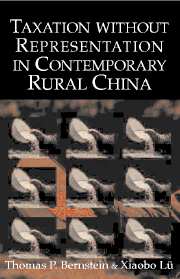Book contents
- Frontmatter
- Contents
- List of Journals, Newspapers, Translation Services, and Abbreviations
- List of Tables and Figures
- Preface
- 1 Introduction
- 2 Peasants and Taxation in Historical Perspective
- 3 Extracting Funds from the Peasants
- 4 Institutional Sources of Informal Tax Burdens
- 5 Burdens and Resistance: Peasant Collective Action
- 6 Containing Burdens: Change and Persistence
- 7 Burden Reduction: Village Democratization and Farmer National Interest Representation
- 8 Conclusions
- Bibliography
- Index
2 - Peasants and Taxation in Historical Perspective
Published online by Cambridge University Press: 13 July 2009
- Frontmatter
- Contents
- List of Journals, Newspapers, Translation Services, and Abbreviations
- List of Tables and Figures
- Preface
- 1 Introduction
- 2 Peasants and Taxation in Historical Perspective
- 3 Extracting Funds from the Peasants
- 4 Institutional Sources of Informal Tax Burdens
- 5 Burdens and Resistance: Peasant Collective Action
- 6 Containing Burdens: Change and Persistence
- 7 Burden Reduction: Village Democratization and Farmer National Interest Representation
- 8 Conclusions
- Bibliography
- Index
Summary
HISTORICAL comparison can often yield telling clues about contemporary problems. To a remarkable extent, taxation as an issue in state–peasant relations in the 1990s echoes China's prerevolution past. Then as now, regimes appeared unable to devise, implement, and enforce a fair, equitable, and reasonably honest system of taxation. Then as now, regimes relied heavily on informal, ad hoc ways of funding governmental activities. Then as now, informal levies gave rise to widespread corruption. Then as now, the authorities had difficulty determining just how much households owed in terms of land and other taxes. Then as now, rural taxation was a major source of grievance and social instability.
The aim of this chapter is to illuminate the continuities and differences in the Chinese history of rural taxation by briefly examining the imperial and Republican periods as well as the Communist revolution and the Maoist era.
RURAL TAXATION IN IMPERIAL CHINA
China was an agrarian economy. Land taxes were the major source of revenue for the imperial government. As Table 2.1 indicates, the land tax plus surcharges (haoxian) together accounted for more than two-thirds of total revenue.
Because of their dependence on the agricultural population, most Chinese emperors adhered to a low-tax doctrine. They thought of themselves as Confucian benevolent rulers whose task it was to nourish the people. They feared that encroaching on peasant subsistence would threaten dynastic legitimacy and lead to disorder, if not rebellion.
- Type
- Chapter
- Information
- Publisher: Cambridge University PressPrint publication year: 2003



